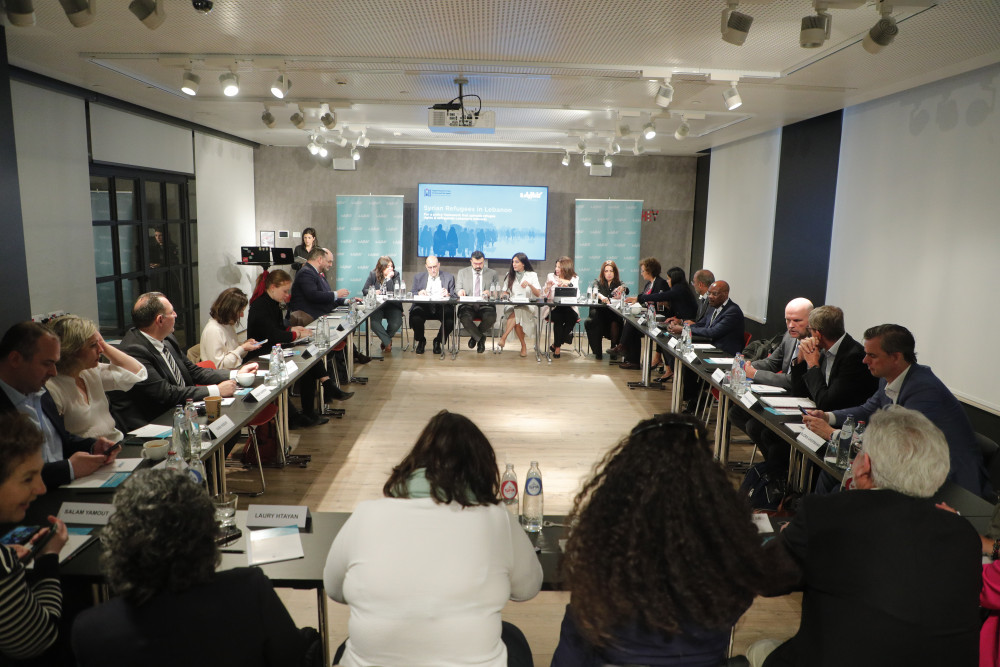Syrian refugees in Lebanon: For a policy framework that upholds refugee rights and safeguards Lebanon’s interests
May 28, 2024
On the sidelines of the 8th Brussels Conference on “Supporting the future of Syria and the Region”, Kulluna Irada, a Lebanese advocacy group, organized a roundtable discussion on “Syrian Refugees in Lebanon: for a policy framework that upholds refugee rights and Safeguards Lebanon’s interests”. Several officials involved in refugee issues at the UN and European level took part in the meeting held on Monday, May 27, 2024, at the Radisson Red Hotel in Brussels.
The Syrian Refugee Crisis has taken a severe toll on Lebanon, today hosting the highest refugee population per capita worldwide, and is leading to increased tensions. The discussion revolved around the policy landscape surrounding the crisis from a Lebanese perspective and the feasibility of sustainable solutions in Lebanon in the absence of a political solution in Syria in the near term.
Kulluna Irada proposed approaches shared across a wide group of civil society and political actors in the country. It stressed the need to better understand and categorize Syrian presence in Lebanon, to regulate the labor market which is already suffering from rampant informality and to prioritize a political and technical discussion over greater border control. The objective should be to reassess the security situation in Syria to allow for the voluntary return of Syrians to their homeland, independently of the political track regarding Syria’s future. Support should be provided to returnees to ensure a dignified and sustainable return.
After welcoming remarks from Kulluna Irada board Co-Chair Wafa Saab, Kulluna Irada Managing Director Diana Menhem emphasized that Lebanon's burden of hosting Syrian refugees is no longer sustainable. She called for the expansion of current aid to Lebanon and to channel it across three key areas: categorization of Syrians residing in Lebanon as refugees and non-refugees, labor market regulation, and border control. Menhem noted that the international community's policy has become untenable. "The security situation in Syria must be reassessed to facilitate the return of refugees. Some European states are beginning to call for this to happen, she said. Aid and support must be provided to those who wish to return. Resettlement rates in third countries should be increased for political refugees whose return would put their lives at risk. The level of aid to Lebanon must be upgraded, given the growing disparity between Lebanon's needs to host refugees and the support provided by donor countries."
"The European Union must adopt a more pragmatic and nuanced approach to the Syrian refugee crisis, said Lara Saadeh, a Legal and Policy Advisor. We can no longer hold the return of refugees hostage to the elusive political solution in Syria. It is imperative that we decouple these issues and explore avenues for facilitating voluntary repatriation based on a comprehensive, area-by-area assessment of the security situation on the ground. This approach could pave the way for durable solutions. Continued intransigence on this front will only prolong the suffering of millions of displaced Syrians yearning to return home, and risks catalyzing an escalation of tensions, violence, and conflict in Lebanon."
“The mounting tensions, increased vulnerability of both Lebanese and Syrian communities, and the potential of radicalization and militarization of Syrian refugees in Lebanon all contribute to a perfect storm that threatens to overwhelm Europe with another influx of illegal migration, said Elie Abu Aoun, Senior Advisor on Peace, Conflict & Security and Visiting Lecturer at Saint Joseph University. "Ignoring these warning signs increases security risks in Lebanon and Europe."
Ali Mourad, legal advisor to Kulluna Irada, said: "If Lebanon's interest today lies in the return of Syrians to their country, it is necessary to discuss the obstacles that must be addressed to secure this return. The first obstacle is that the Syrian regime does not want Syrians to return after it has deliberately acted to change the demographic composition of Syria. If the regime eventually decides to accept their return, it will do so at a financial and political price. The second obstacle is that the international community has linked the return to a political solution in Syria and to reconstruction. This necessary linkage of the three tracks conflicts with Lebanon's interests. Third, the Arab countries that normalized relations with the Syrian regime did not impose conditions related to the return of refugees. Fourth, the Lebanese government does not have enough data to be equipped to prepare for the return, making it difficult to act in the event of a political solution.”
The meeting was attended by several officials concerned with the refugee issue at the UN and European levels, including: Najat Rochdi (Deputy UN Special Envoy for Syria); Alexander Tyler (Senior Liaison Adviser, UNHCR Representative for the Middle East and Africa); Ivo Freijsen (UNHCR Representative in Lebanon); Imran Riza (UN Resident and Humanitarian Coordinator in Lebanon); Adam Abdelmoulla (UN Resident and Humanitarian Coordinator in the Syrian Arab Republic); Alessio Cappellani (Director of the Middle East Division of the European External Action Service); Sebastien Brabant (Deputy Head of the Middle East Division of the European External Action Service); Stefano Ravagnan (Italy’s Special Envoy for Syria); Björn Ghermann (Germany’s Special Envoy Deputy for Syria); Johannes Hoogeveen (Director of the Poverty and Equity Global Practice in the Middle East and North Africa Region at the World Bank); Mazen Darwish (President of the Syrian Center for Media and Freedom of Expression), Moatasem Sioufi (Executive Director of The Day After), Yara Chahed (International Center for Transitional Justice), and Yara Nseir (LDSPS).
Press contact:
Elsy
Moufarrej [email protected] ;
+9613542696.